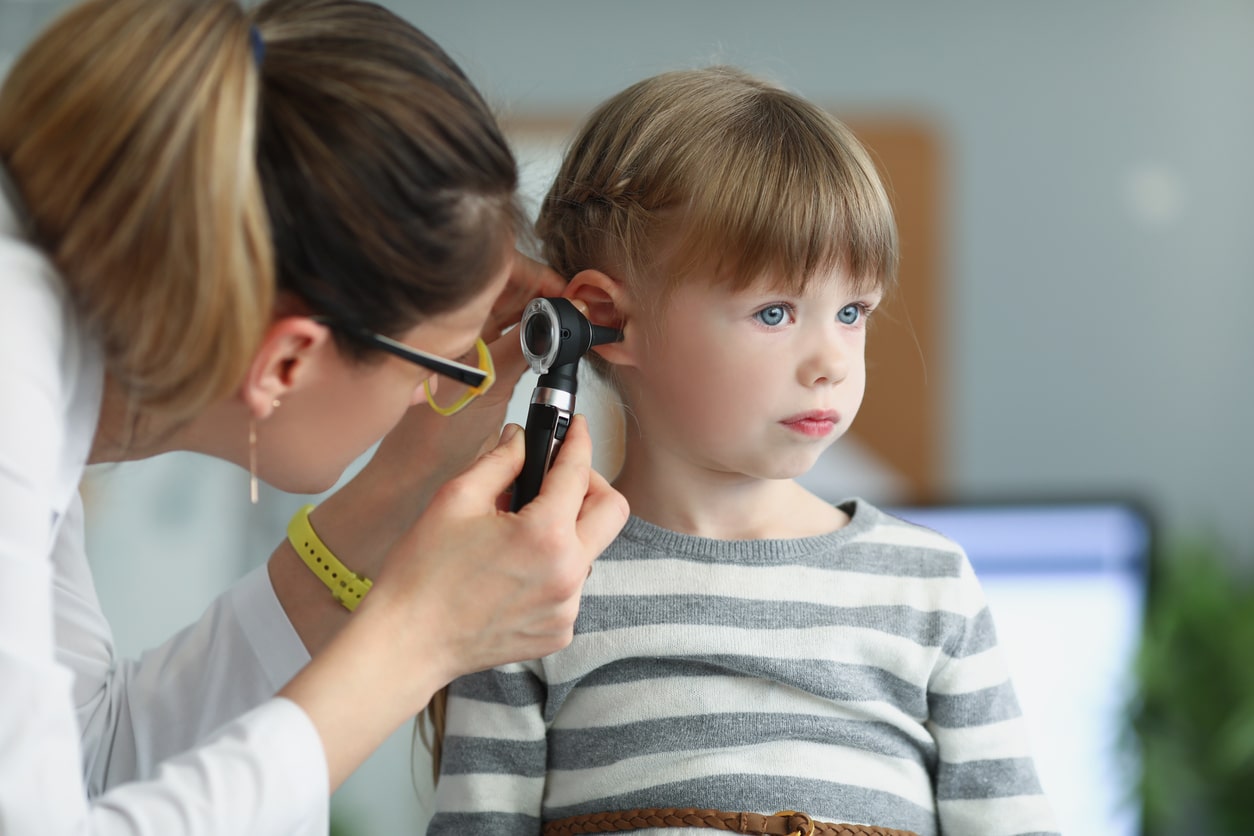It’s estimated that two to three out of every 1,000 children experience a detectable level of hearing loss in one or both ears at birth. Similarly, one in every three children is treated for an ear infection before age three. And while adults can easily articulate hearing loss or a persistent earache, it isn’t always easy for children.
As a caregiver, it’s important to understand the importance of ear checks and the signs of ear infections, hearing problems, and other auditory issues, so you can offer the support your child needs—when they need it. Learn everything you need to know about pediatric ear health and when it may be time to see a specialist like the experts at UAB Medical West.
Pediatric Ear Health 101
Most caregivers understand the importance of hearing since it’s an essential part of our daily lives. Not only does the auditory system control our hearing, but it can also affect other vital systems, like balance, not to mention the quality of life. For both you and your child, hearing impacts relationships, life events, and overall happiness.
Importance of Ear Checks
Before we discuss the importance of ear checks, it’s essential to understand the difference between hearing loss and ear infections. While ear infections may cause hearing issues because of a fluid buildup, any problems should subside as the infection heals. On the other hand, hearing loss is permanent and is often detectable at birth. During the first few years of life, your doctor will check your child’s hearing regularly, whether at a scheduled well appointment or sick visit.
Ear Infections
An ear infection is an inflammation of the middle ear that occurs when fluid builds up behind the eardrum. Usually caused by bacteria, ear infections are extremely common in children. This is because children’s eustachian tubes are smaller than adults, making it harder for fluid to drain correctly.
Signs of an Ear Infection
There are different ear infections, but most kids are diagnosed with Acute otitis media, characterized by an earache, fever, and trouble hearing. Additionally, if you notice your child is tugging on their ears, is persistently fussy, has a fever, or isn’t sleeping well, it may be time to see a doctor. You may also see fluid draining from their ears or notice balance problems.
When to See a Specialist
If you think your child may have an ear infection, we recommend seeing their primary care physician, who can evaluate their symptoms, diagnose an infection, and provide treatment. Your doctor may prescribe your child antibiotic ear drops and recommend OTC (over-the-counter) medications like ibuprofen to manage pain.
If your child has frequent ear infections, your primary care doctor may refer you and your child to an ENT specialist. As mentioned, children’s eustachian tubes are so small that fluid can quickly become clogged in the middle ear, causing ear infections and balancing problems. Ear tubes can be placed in the eardrum to keep fluid moving, reducing ear infections, inflammation, and hearing problems related to the fluid.
For more information about pediatric ear tubes, contact our expert otolaryngologists at UAB Medical West.
Hearing Loss
Hearing loss can either be temporary or permanent and can be caused by numerous factors. If acquired, it can result from head trauma, illness, exposure to loud noises, or certain medications or treatments. However, approximately four in every 1,000 children are diagnosed with hearing loss at birth, usually due to uncontrollable factors like genetics or birth complications.
Signs of Hearing Loss
Your child is screened for hearing loss numerous times during their development, including the first month of life and well-visit checkups. Many schools also require a hearing screening before your child begins school as well.
In infants, some signs of hearing loss include:
- Not getting startled or upset by sudden noises
- Not recognizing a caregiver’s voice by three months of age
- Not turning their head towards a sound by six months of age
- Not imitating sounds by 12 months of age
In toddlers and older children, the symptoms are different. We recommend you look at the following signs, including:
- Delayed language skills
- Lack of response when their name is called
- Trouble hearing over mild background noise
- Abnormal speech and language
- Only listening to TV or music at a high volume
When to See a Specialist
If you notice any signs of hearing loss in your child, it’s important to schedule an appointment with your child’s pediatrician. There are various types of hearing loss, which can be temporary or permanent, so seeking medical treatment as soon as possible is paramount.
At UAB Medical West, our team of family doctors, otolaryngologists, and audiologists are here for you and your family. We offer state-of-the-art treatments and solutions to pediatric hearing loss, such as hearing aids. If you suspect your child may have hearing loss, don’t hesitate to make an appointment with one of our experts.
Detail-Oriented Pediatric Care You Can Trust
As a parent, you know your child best. You look forward to hearing them laugh, call you “mommy” or “daddy”, and create long-lasting memories as they grow up. But when hearing loss and consistent ear infections get in the way of properly communicating, it can be difficult and overwhelming. At UAB Medical West, we understand the importance of keeping your child safe and healthy. Our team of professionals value you and your child and are always ready to listen to any questions or concerns you may have.
Need to Schedule a Pediatric Hearing Check? Call Alabama’s Premier Otolaryngologist Team
Proudly serving Birmingham, AL, and surrounding areas, we’re the experts you can count on. From well-child checkups and hearing screenings to sick visits and ear tube placement, UAB Medical West is ready to provide the medical support your child needs. Call us at (205) 996-WEST to schedule an appointment today!
